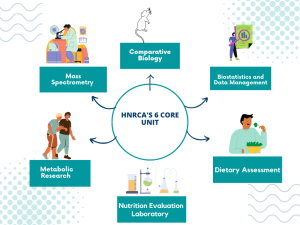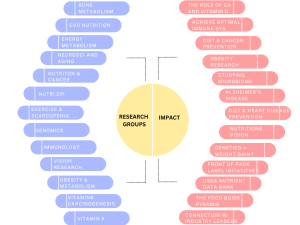Welcome to our Featured Employer series where we feature different companies/organizations in the food, nutrition, and public health field!
What do they do?
The Jean Mayer USDA Human Nutrition Research Center on Aging (HNRCA) is one of the largest research centers studying aging and its relationship to nutrition and physical activity. It is supported by the United States Department of Agriculture (USDA). Run by both the USDA and Tufts University, the HNRCA is where graduate and post-doctoral students train in healthy aging and physical activity research. Many of the scientists at the HNRCA are also faculty members of Tufts University.
There are 14 research directions supplemented and supported by six core units.
Research Directions:
- Bone Metabolism – how bone and muscle health can be affected by diet quality in older adults.
- Cardiovascular Nutrition – how dietary factors can affect different risk factors of dietary diseases.
- Energy Metabolism – how lifestyle interventions (energy intake regulation) can reduce the obesity epidemic.
- Neuroscience and Aging – the affect of nutrients and bioactive compounds on improved brain function in older adults.
- Nutrition and Cancer Biology – how the anti-inflammatory effects of bioactive compounds in fruit and vegetables can prevent carcinogen-related inflammation.
- Nutritional Epidemiology – how lifestyle, environment, and genetic factors affect nutritional status, as well as how nutritional status can affect the development of chronic disease.
- Nutrition, Exercise Physiology and Sarcopenia – the potential of nutrition and physical activity interventions to prevent impaired motor performance.
- Nutrition and Genomics – the gene-diet relationship, particularly in the case of cardiovascular diseases.
- Nutritional Immunology – the relationship between dietary components and immune and inflammatory responses, as well as the interaction between dietary components and other environmental factors.
- Nutrition and Vision Research – methods of delaying age-related eye diseases.
- Obesity and Metabolism – the basis of obesity from the molecular, cellular, and systemic perspectives.
- Vitamins and Carcinogenesis – how one’s diet can change cancer-causing pathways.
- Vitamin K – the benefits of increased vitamin K intake.
Core Units:
- Biostatistics and Data Management – ensuring the most appropriate methods for data analysis are used and missing data is properly handled.
- Comparative Biology – providing researchers with quality animals for experiments and maintaining the facilities and services to make sure animal-related experimentation is performed humanely and scientifically.
- Dietary Assessment – providing insights and support for dietary data assessment.
- Mass Spectrometry – ensuring the quantification and identification of vitamins, amino acids, nucleic acids, lipids, fatty acids, retinoids, carotenoids, antioxidants, peptides, and proteins are performed in reliable methods.
- Metabolic Research – ensuring IRB compliance for all experiments, reliability of study-specific diets, and recruitment of volunteers.
- Nutrition Evaluation Lab – providing biochemical testing.


What do they care?
The HNRCA’s mission is to “promote healthy aging through nutrition science to empower people seeking to enjoy long, active, and independent lives.”
How can I get involved?
- Attend the Monday Seminar Series where scientists present their research related to aging and nutrition. Registration is required. Past Monday Seminar videos can be accessed here.
- Attend the Core Unit Seminar Series that serves educational and informational purposes. These seminars are held during Fall and Spring semesters online from noon to 1pm. Past recordings can be found here.
- The HNRCA is looking for students to get involved with their research work!
-
- For masters students who are interested in age-related muscle loss and function, dietary factors that promote or protect against cardiovascular disease, cancer, neurodegeneration, nutrient requirements, novel nutrient functions, nutrition and immunity, nutrigenomics, and personalized nutrition, consider getting involved with the HNRCA. Contact Stefania Lamon-Fava, MD, PhD.
- For doctoral students who are interested in incorporating the HNRCA into their program, contact your program head directly.
- For post-doctoral opportunities, applicants may send their cover letters and CVs directly to the potential HNRCA researchers/mentors or the HNRCA Postdoctoral Office.
-
Employment Opportunities:
Scientist II
- Plan and conduct independent research
- Develop grant proposals
- Mentor and otherwise guide students
- PhD, MD, or equivalent terminal degree, 3–5 years experience
Research Coordinator – Precision Nutrition
- Strong data management skills
- Assist in various study tasks during active studies, including participant scheduling, physical measurements, biospecimen processing and shipping
- Bachelor’s degree in nutrition or other health-sciences field and 2+ years experience
Sr Nutrition/Diet Technician
- Experience with diet screening, diet education, and diet development
- Assist in meal preparation and portioning of metabolic research diets
- Maintain records of food use, meal census and inventory
- Bachelor’s degree in nutrition or Diet Technician, Registered (DTR), 3-4 years experience in food service
Interview with MS student Aoife O’Flaherty:
Aoife is a second year Nutrition Interventions, Communication, and Behavior Change student at the Friedman School of Nutrition. She was a graduate assistant in HNRCA from 2021-2022.
- Tell us about your role at the HNRCA. How does it connect to your personal and professional interests?
I worked in the epidemiology department at the HNRCA, coding Food Frequency Questionnaires for the Framingham Heart Study. Each FFQ had been completed by a participant so our job was to go through and code the responses so they could be used by the researchers working on the study. This was great experience to understand the ins and outs of FFQs, learn about what people are eating in a particular population, and have a small part in a well-known study. - What are the necessary skills needed for your position?
Be detail-oriented and meticulous. It was important to pay close attention to avoid making a mistake or missing something. - What do you enjoy about your role? What do you find challenging?
I enjoyed being a part of the Framingham Heart study and getting extensive experience working with an FFQ. The biggest challenge was maintaining close concentration to the questionnaires for long periods of time while remaining diligent.


